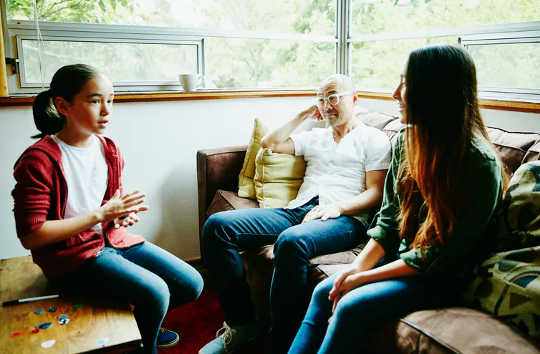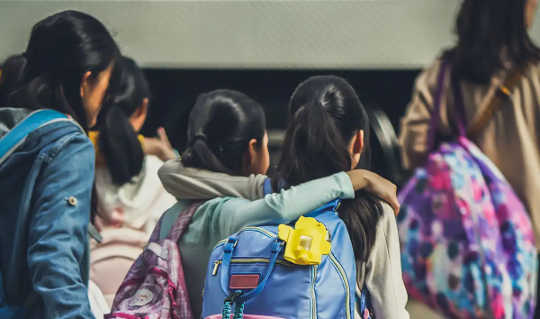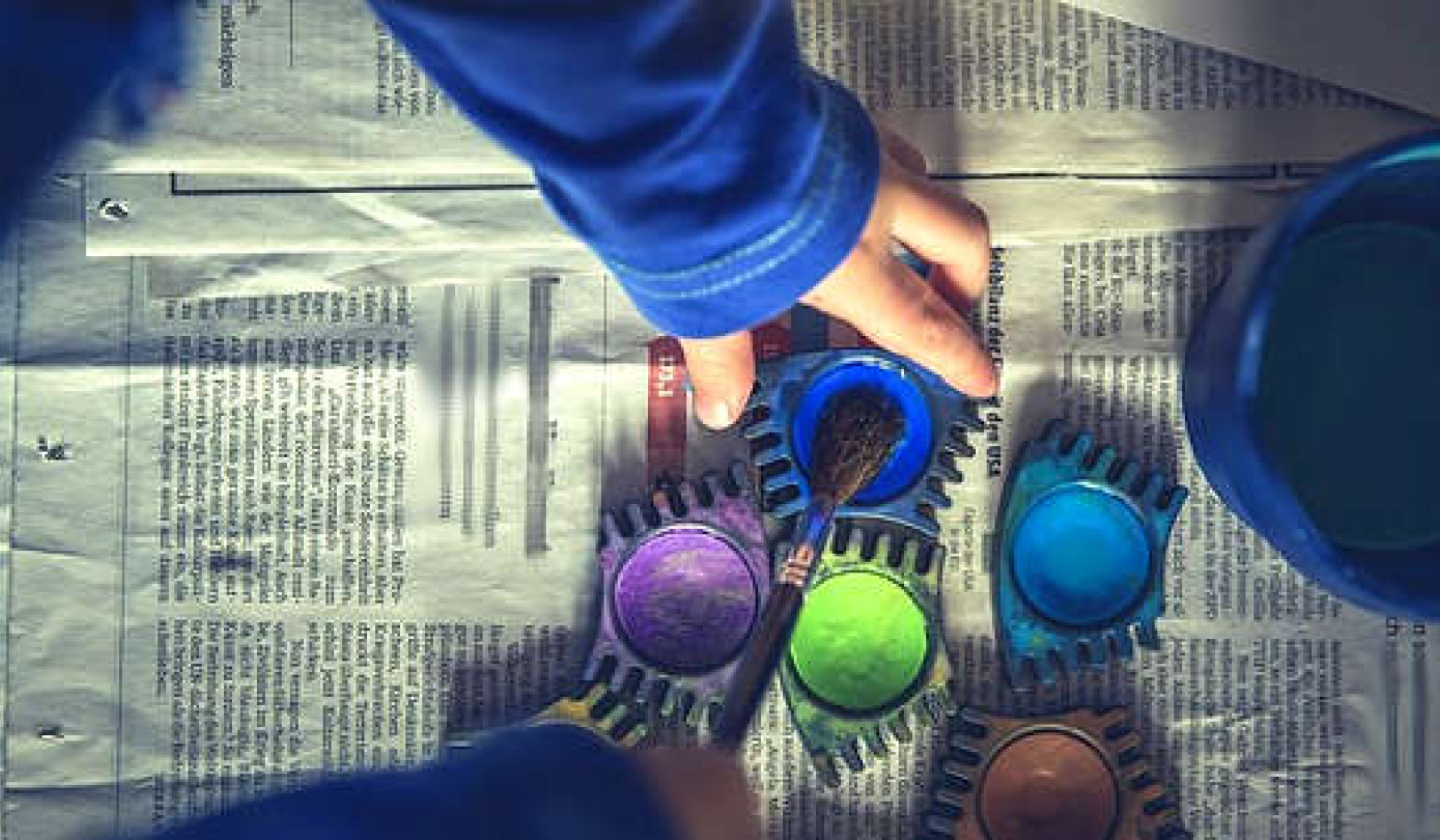
Kids learn who they are and how to cope within their families. Thomas Barwick/Stone via Getty Images
The choice between in-person learning, where available, and remote learning is a fraught one for parents. Children experience joy and connection when they learn alongside other kids, but they risk being exposed to the coronavirus. Remote learning at home can protect kids from COVID-19, but does it set back their social-emotional development?
It may feel like a stark choice between mental or physical health. But as a family therapist and professor of educational psychology who studies resilience in families under stress, I can assure you there’s no single schooling option that guarantees a happy, healthy kid or dooms a child to despair.
In fact, much more than schooling context, children’s mental health relies on high-quality relationships within families.
 Children can be missing their school friends but still be doing OK at home. Free To Use Sounds/Unsplash, CC BY
Children can be missing their school friends but still be doing OK at home. Free To Use Sounds/Unsplash, CC BY
Spending time with other children can benefit children’s mental health, though it’s not clear that group settings are necessary to achieve those gains. Some research from before the pandemic found that home-schooled children experience more academic success and better mental health compared to kids in school, especially when families maintain ties to religious institutions and community groups. Other studies show no differences or suggest that home-schooled children fall behind their peers, especially when structure at home is too loose. And of course processes within schools during the pandemic will change how children interact.
No matter what the schooling situation, there are four key components that belong in a child’s mental health toolkit. The good news is that parents can support all of these areas as part of in-person, remote or small-pod learning.
Connecting mind and body: ‘What I need’
Mental health and physical health are inextricably linked. Physical activity, good nutrition and sleep are all crucial for both. Children need clear bedtime routines and a consistent schedule – especially during times of unease like now. Children need to go to bed at a similar time each evening and wake up at a similar time each morning.
This guidance applies across ages. Though it’s normal for sleep schedules to shift in adolescence, consistency remains critical. Research increasingly shows that poor sleep hygiene is a central issue in symptoms of depression, anxiety and other mental health problems.
Developing identity: ‘Who I am’
Children of all ages incorporate information from both family members and peers into their sense of identity.
School exposes students to others with similar and different viewpoints or backgrounds and lets them confront social rules. Research with home-schooled children shows that interacting with other home-schooled kids is good for their mental health. Peer relationships, especially in adolescence, are related to self-esteem. Overall, positive peer relationships throughout childhood can help students adjust in school, while bad experiences leave the strongest mark on mental health.
But it’s kids’ empathy and pro-social behaviors, like helping someone in need – characteristics they largely learn in their families – that help them build and maintain their friendships. If you’re worried about kids being isolated while learning remotely, remember that parent-child attachment is the most important source of self-esteem and a positive sense of self for children.
Focusing on reciprocity is one way families can help kids explore identity. Parents should ask open-ended questions and show curiosity about children’s opinions and interests. Family rituals, like a special weekly dinner, family game night or a loving bedtime ritual, can support family bonding and help children gain a strong sense of self, contributing to better mental health. Parents can try to engage in 20 minutes of joyful, focused interaction with their kids each day and consistently observe and promote their children’s positive attributes.
Regulating emotions: ‘How I feel’
Skills that allow children to understand their emotions and make choices about how they respond to them are crucial building blocks of good mental health. Families can practice regulating emotions with their children, supporting strategies to understand and manage frustration, anger and sadness when those feelings become unmanageable. Experiencing joy and positive emotions supports good mental health.
Children are likely to experience complex emotions in the coming months. At school, kids may have a hard time separating from family or difficulty when confronted with new safety measures and expectations. In addition, existing school-based risk factors like bullying may exacerbate mental health issues. Children at home may feel disconnected and pick up on stress within families facing work and income challenges. Ongoing issues in families like parental mental health problems and family violence can also put children at risk.
 A creative outlet can help children manage emotions. Madalyn Cox/Unsplash, CC BY
A creative outlet can help children manage emotions. Madalyn Cox/Unsplash, CC BY
When children face emotions that are unfamiliar, dysregulated behavior – which can include sleeplessness, aggression or listlessness, for example – may be a first indicator for adults, who can step in with emotion coaching. Parents can regularly check in with children to take their “feelings temperature” and suggest ways to practice coping.
Outlets for creative expression, like art, music and dance, can support positive emotional development and coping, as well.
Recognizing interdependence: ‘Who we are’
A big piece of good mental health is being able to see yourself as a part of a whole.
The parent-child relationship is the context in which children learn to view themselves as interdependent – a person who is connected to previous generations and present networks.
Responses to the pandemic can threaten the usual sense of community. To help make up for any isolation, whether due to remote learning or physical distancing measures, families can provide opportunities for children to consider others’ feelings and practice giving and receiving emotional support.
Parents must attend to their own mental health; research shows that if parents struggle with depression, aspects of children’s social-emotional development – including building empathy skills and engaging socially – can also suffer.
Challenges abound, but the tools are consistent
Kids who were vulnerable before the pandemic remain vulnerable. But mental health risk factors are largely the same for children whether in school or learning from home.
Any changes, even happy ones, can create stress. Good mental health is the ability to adapt. The strategies in this toolkit can help children adapt and cope with stress, whether due to the pandemic, economic inequities, racism, unaddressed special needs or interpersonal problems within a family.
Some children need to be in school. Their learning needs may be complex or their homes may not be safe, and they depend on school to buffer problems at home. But the argument that all children in general must be at school to ward off a mental health crisis just is not true. Wherever and however kids are learning this year, families can support students so they continue developing as mentally healthy individuals.![]()
About the Author
Erika Bocknek, Associate Professor of Educational Psychology, Wayne State University
This article is republished from The Conversation under a Creative Commons license. Read the original article.

Related Books:
Here are 5 non-fiction books on parenting that are currently Best Sellers on Amazon.com:The Whole-Brain Child: 12 Revolutionary Strategies to Nurture Your Child's Developing Mind
by Daniel J. Siegel and Tina Payne Bryson
This book provides practical strategies for parents to help their children develop emotional intelligence, self-regulation, and resilience using insights from neuroscience.
Click for more info or to order
No-Drama Discipline: The Whole-Brain Way to Calm the Chaos and Nurture Your Child's Developing Mind
by Daniel J. Siegel and Tina Payne Bryson
The authors of The Whole-Brain Child offer guidance for parents to discipline their children in a way that promotes emotional regulation, problem-solving, and empathy.
Click for more info or to order
How to Talk So Kids Will Listen & Listen So Kids Will Talk
by Adele Faber and Elaine Mazlish
This classic book provides practical communication techniques for parents to connect with their children and foster cooperation and respect.
Click for more info or to order
The Montessori Toddler: A Parent's Guide to Raising a Curious and Responsible Human Being
by Simone Davies
This guide offers insights and strategies for parents to implement Montessori principles at home and foster their toddler's natural curiosity, independence, and love of learning.
Click for more info or to order
Peaceful Parent, Happy Kids: How to Stop Yelling and Start Connecting
by Dr. Laura Markham
This book offers practical guidance for parents to shift their mindset and communication style to foster connection, empathy, and cooperation with their children.

























